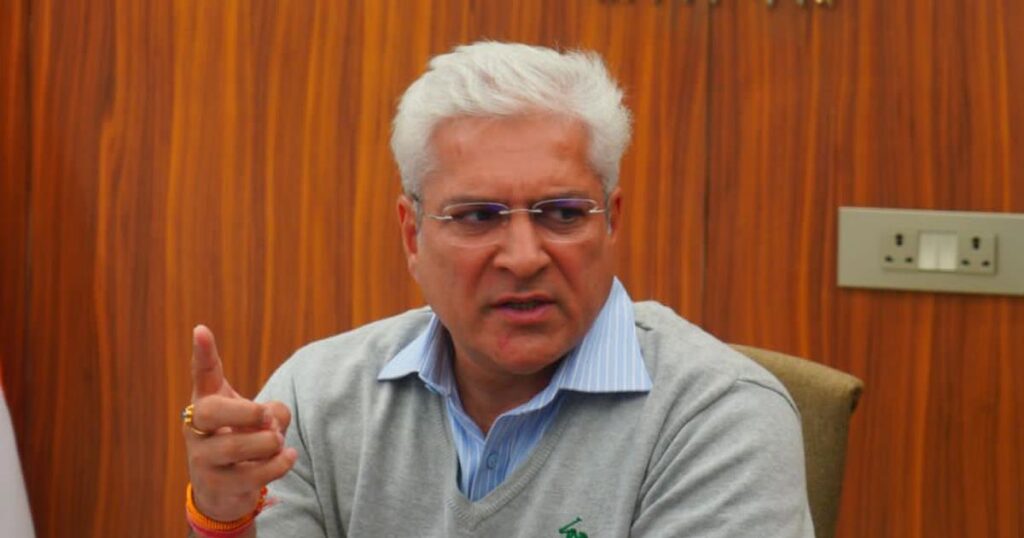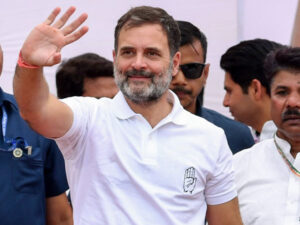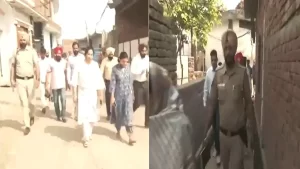
The resignation of Kailash Gehlot, Delhi’s Transport Minister, from his ministerial role and the Aam Aadmi Party (AAP) has prompted a sharp response from the Bharatiya Janata Party (BJP). Gehlot’s departure, which was accompanied by serious allegations against AAP’s leadership, particularly former Chief Minister Arvind Kejriwal, has intensified political tensions in Delhi.
Reacting to Gehlot’s exit, Delhi BJP President Virendra Sachdeva held a press conference where he openly commended Gehlot’s decision. Sachdeva said, “Kailash Gehlot has directly confronted Arvind Kejriwal, highlighting how Kejriwal and his associates have been exploiting the people of Delhi. Gehlot’s choice to resign reflects his unwillingness to be part of such practices.”
Sachdeva further alleged that under Kejriwal’s administration, public resources have been misused. He cited the “Sheeshmahal” controversy—a reference to Kejriwal’s official residence renovation—as an example, claiming that tax revenue meant for public welfare was squandered. Additionally, Sachdeva accused Kejriwal’s government of mismanaging an Rs. 8,500 crore fund from the Central Government intended for cleaning the Yamuna River.
In his resignation letter addressed to Arvind Kejriwal, Gehlot expressed his dissatisfaction with the current state of affairs within the AAP. Thanking Kejriwal for the opportunity to serve Delhi’s residents as both a minister and an MLA, Gehlot wrote, “Today, the Aam Aadmi Party faces significant challenges.”
He added that the party’s focus on politics over governance has led to numerous unfulfilled promises, particularly the pledge to clean the Yamuna River. According to Gehlot, the river’s pollution levels have worsened instead of improving.
Gehlot also referenced the Sheeshmahal controversy in his letter, acknowledging its negative impact on public trust in the AAP. This issue has reportedly created skepticism among citizens who once saw the AAP as a party committed to transparency and accountability, Kailash Gehlot said.
Gehlot’s resignation letter did not stop at criticizing policy failures. He voiced disappointment over AAP’s focus on political disputes rather than addressing public issues.
He noted, “Instead of tackling public problems, our priority has shifted to political agendas. It’s now evident that the AAP government cannot achieve meaningful development for Delhi while it remains embroiled in conflict with the Central Government.”
This criticism aligns with the BJP’s stance on AAP’s governance, as the party has often accused Kejriwal’s administration of prioritizing political confrontations over welfare initiatives.
Concluding his letter, Gehlot emphasized his commitment to serving the people of Delhi. “I began my political career to serve the people, and I want to continue that mission. Remaining with AAP is no longer aligned with my goals. Therefore, I resign from the primary membership of AAP,” he wrote, extending his best wishes to Kejriwal for his health and future.
Gehlot’s resignation and the allegations raised could signal a new phase of political realignment within Delhi’s AAP government. His departure could also influence other AAP members who may share similar concerns. The BJP’s vocal support for Gehlot’s decision reflects their ongoing criticism of AAP’s leadership, and it suggests they may use this development to strengthen their position against Kejriwal in upcoming electoral campaigns.
The timing of Gehlot’s resignation and his comments could have lasting impacts on Delhi’s political landscape, especially as parties begin strategizing for future elections. With Gehlot now outside AAP, the BJP may attempt to leverage his criticisms to appeal to voters disillusioned by the current administration’s policies.






